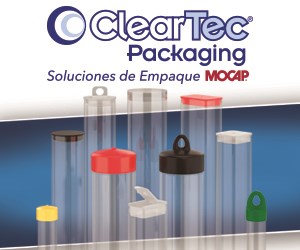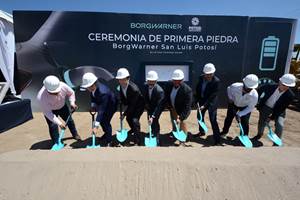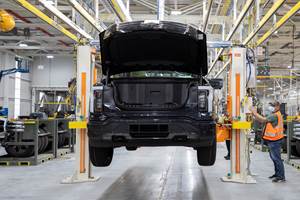“With respect to quality, I believe that Mexico equals Europe or the United States”
Wolfgang Hellnick, general director of the German company Emuge-Franken in Mexico, talks about the industry and the future of the manufacturing sector in Mexico.
Compartir
Lea a continuación
Wolfgang Hellnick, known in Mexico as "Pepe," has lived in Mexico for three decades and is a lover of its culture and a promoter of its industry. In this interview, he tells us about his career in the industry and how he sees the development and challenges of the Mexican metalworking sector.

How was your arrival in Mexico, how did you start working in the metalworking industry?
Pepe Hellnick: In the 1960s, when I was very young, my family emigrated from Germany to the United States, to the city of Detroit, Michigan. There my father worked in the aerospace industry as an engineer on the first design of the Jumbo Jet 747. After that, he worked in some automotive plants and finally in a plant in Detroit in the oil sector.
Eventually, my dad was asked to open a new branch in Houston, Texas, and with that the family left Detroit for Houston. In Houston, my dad also had a company with many machines which produced an oil pipe coupling, which connected the pipes on both sides by means of threads. I worked for him at this facility, which was my first opportunity to practice my Spanish, because the operators of the machines were from Mexico and Guatemala.
Eventually, I found an opportunity to work with Mastertool, a tool supplier that sold to various machine shops, including my dad’s. The people at Mastertool asked me if I could sell their tools in Mexico. When I was younger, I went to Mexico many times because I like the beaches of Michoacan for surfing. I accepted the position at Mastertool to work in Mexico, a company focused on the automotive industry. It didn’t take me long to become 100% focused on Mexico, and I moved from Houston to the border. That’s how I started traveling every week to Mexico and why I bought a house in San Luis Potosi. Now I am in Mexico full-time and have spent 28 years with tool businesses in the country.
When did you start working with Emuge and how has the industry evolved since you started working there? How have you seen the growth, especially in the automotive industry and the aerospace industry, which are the industries you serve most in Mexico?
Pepe: In 1997-98, I sold my first Emuge brand product. After a couple of years as a distributor I started directly with Emuge in 2000. In 2010, we opened Emuge Franken S.A. de C.V. in the city of Querétaro. We have been here for about 10 years and I am happy to announce that in 2021 we will begin to expand our facilities and our presence in Querétaro and Mexico.
Obviously, the automotive industry has heavily expanded in several countries, mainly in the United States. Germany is also investing a lot of money, as well as Japan, China and France. In the last 20 years the automotive sector here in the country has increased a lot, as has the aerospace industry – which fits very well with our Franken line, which are specific tools for the aerospace sector. The whole industry has grown a lot in Mexico in the last 20 years.
Between the years 2000 and 2010, sales growth was very slow. In those 10 years, sales increased between 300 to 400 percent and there was no growth in aerospace. In 2010, Emuge began to focus on the new aerospace plants in Querétaro. From 2010 to 2019, we had about an 800-percent increase in sales. The aerospace sector, which in 2010 was at zero in our business, in 2019 was already 60 percent of the whole business. That’s good, but dangerous too, as we saw with the problems of the Boeing 737 Max, the engine of which is what we produce here in Mexico. Because of that, sales dropped a lot in 2019. In 2020 with COVID-19, the industry declined a lot, but we have other aerospace customers, not just the products of the 737 engines. In 2020, aerospace sales were down 50 percent. But every year the automotive sector is going up little by little for us, more gradually.
How has the automotive industry grown for you?
Pepe: While the aerospace sector is growing very fast, the automotive sector is more stable. Sometimes it’s a little less, sometimes a little more, but with COVID-19 everything has been a little different this year.
With the COVID-19 issue, how have you handled it, how do you see the situation – especially with the aerospace industry – and what do you expect from the aerospace industry this year and in 2022?
Pepe: I think 2021 will be another not-so-good year for the aerospace industry. I guess in 2022 and 2023 there will be a lot more movement from the industry, but I think that when you have the control of the coronavirus – which will probably start with the United States in around 6 months – you will be able to see a great effect with the vaccine. After that, I believe it will take three-to-six months to have a very positive effect on travel and the freedom of people to move from one place to another.
I think in June or July of this year we are going to see some recovery along with the information that the 737 Max can fly again, as it is already approved by the Federal Aviation Administration in the United States. I think this situation will take another half-year, but possibly in the second part of 2021 we will have better news regarding the aerospace sector.
What other alternatives have you sought for yourself with this pandemic?
Pepe: We are diversified. The medical sector is very important to us, and it needs very fine, very accurate tools – we have excellent tools such as end mills and special shapes to obtain very good finishing. We also have the cutters and the taps for medical work. The medical sector also has very special threads, so they need very special gages.
The energy sector, like the wind power sector, requires a lot of manufacturing of propellers for energy generation. The oil sector is not as busy, although I think demand will eventually go up. We are also involved in train manufacturing companies.
How do you see the manufacturing industry in Mexico, its way of producing and its quality, compared to the industry in Europe or the United States?
Pepe: The truth is that the equipment I have seen in the plants here in Mexico is often modern and has processes that are normally good, but not outstanding. That is where we come in to help improve the process. So, with respect to the machines and tools, everything you have here in Mexico is almost at the same level. The only thing where there is still a difference is in the education of the workers. It is true that this has changed a lot with new generations of engineers, since they are better prepared, but there is still a little more traditionalism in the plant. With respect to quality, the quality of the products that leave the plants here is equal to the quality in Europe or the United States.
See the video below for the complete interview.
Contenido relacionado
Mata Automotive inaugura planta en Aguascalientes
Mata fabricará alrededor de dos millones de piezas al año para vehículos eléctricos de marcas como Tesla, Audi, Dodge, GM, entre otras.
Leer MásIndustria automotriz en México: balance 2022 y proyecciones 2023
Conozca las estadísticas en producción, exportación y ventas de vehículos en México en 2022. Explore el impacto del nearshoring y la producción de vehículos eléctricos en la industria de autopartes.
Leer MásBorgWarner anuncia inversión en San Luis Potosí
La inversión de BorgWarner permite la creación de una nueva planta de fabricación de componentes electrónicos de potencia y motores eléctricos.
Leer MásIndustria automotriz inicia 2024 con crecimiento
En el primer mes de 2024 la producción de la industria automotriz de México creció 9.56 %, mientras que la exportación creció 6.82 %.
Leer MásLea a continuación
Perspectivas para el sector de maquinaria en México en 2022
Este informe presenta las proyecciones del comportamiento de consumo de maquinaria y equipo para 2022 de acuerdo con los estudios de asociaciones del sector, SIAVI y el Banco de México.
Leer MásSistema de sujeción permite a un taller alcanzar las tolerancias requeridas
Este taller de Monterrey, dedicado a la manufactura de ejes para motorreductores, no conseguía alcanzar las tolerancias exigidas por su cliente. El uso de un collet chuck le permitió lograr las dimensiones requeridas y reducir los tiempos del proceso en 54 %.
Leer MásSistemas innovadores de sujeción para electroerosión y mecanizado de tres ejes
Con el propósito de aumentar el índice de ocupación de máquinas en el taller, este fabricante de moldes adaptó un dispositivo de sujeción en sus máquinas de tres ejes y su electroerosionadora de penetración para aumentar la flexibilidad de sus equipos y ser más competitivo.
Leer Más
.jpg;width=70;height=70;mode=crop)



















